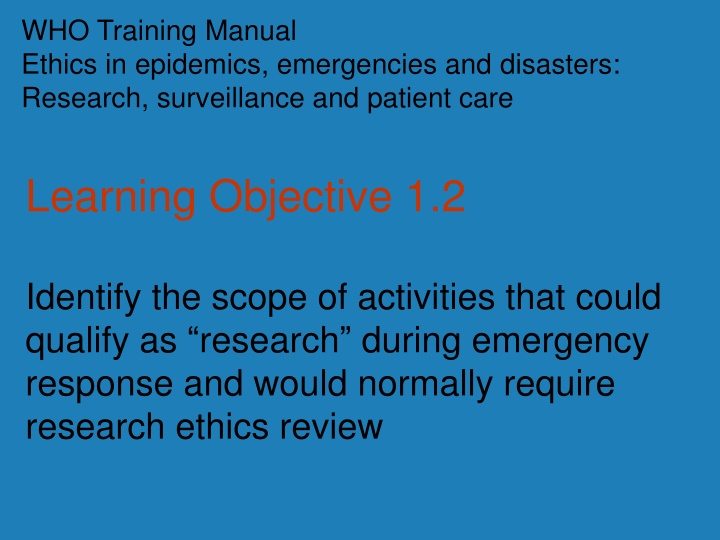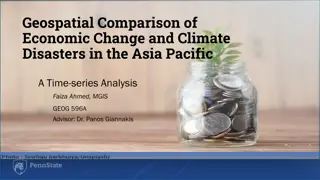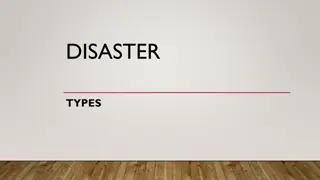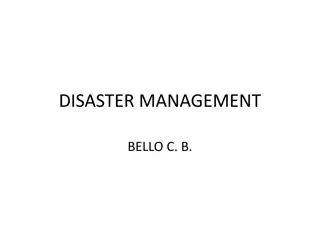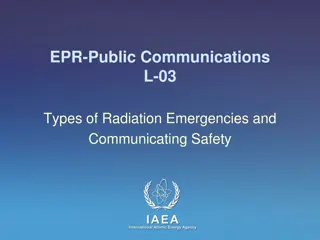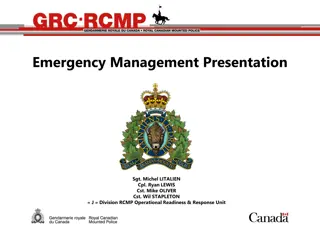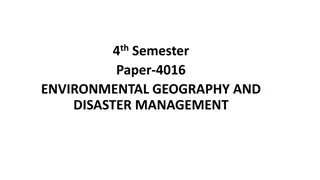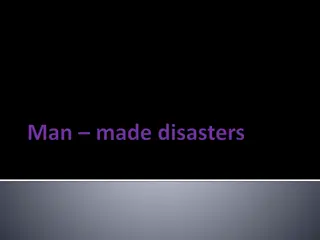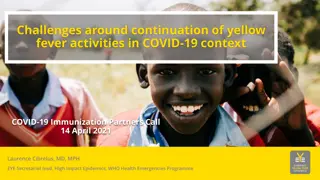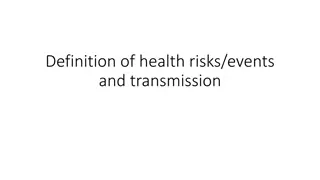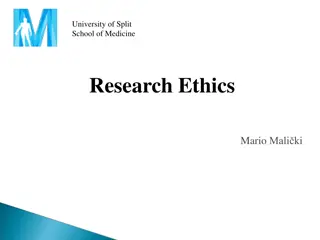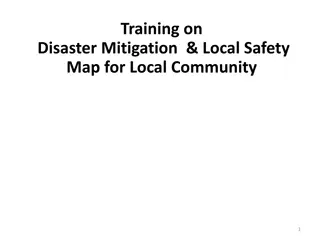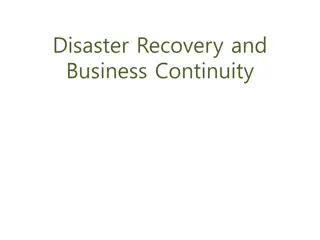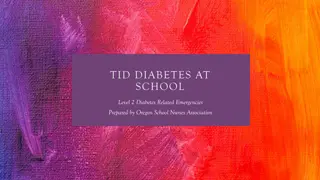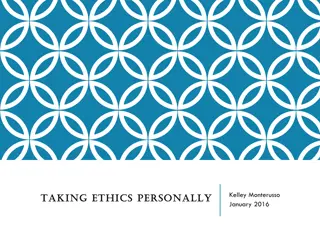Ethics in Epidemics, Emergencies, and Disasters: Research Activities Scope
Scope of research activities during emergencies requiring ethics review. Learn about research ethics committees and the importance of ethical standards in conducting research during crises.
Download Presentation

Please find below an Image/Link to download the presentation.
The content on the website is provided AS IS for your information and personal use only. It may not be sold, licensed, or shared on other websites without obtaining consent from the author.If you encounter any issues during the download, it is possible that the publisher has removed the file from their server.
You are allowed to download the files provided on this website for personal or commercial use, subject to the condition that they are used lawfully. All files are the property of their respective owners.
The content on the website is provided AS IS for your information and personal use only. It may not be sold, licensed, or shared on other websites without obtaining consent from the author.
E N D
Presentation Transcript
WHO Training Manual Ethics in epidemics, emergencies and disasters: Research, surveillance and patient care Learning Objective 1.2 Identify the scope of activities that could qualify as research during emergency response and would normally require research ethics review
Outline 1. Introduction to research ethics review 2. Exercise: Identifying research questions 3. Discussion on types of research 4. Exercise: Identifying research questions revisited 5. Case studies analysis 6. Exercise: Designing a project 7. Summary/Conclusion Suggested time 0-30 min (30 min) 31-50 min (20 min) 51-75 min (25 min) 76-90 min (15 min) Introduction and small slide presentation Small group exercise Summary conclusion Activity Divide the group in teams Team preparation Learning Objective 1.2
Research Ethics Committee Reviews research protocols prior to their implementation Ensures that research protocols meets ethical standards set in international and local guidelines, such as the Declaration of Helsinki Includes individuals with scientific, legal, and also ethical expertise, as well as lay individuals whose primary background is not in research with human participants Provides approval to conduct research if review is positive Learning Objective 1.2
Why does this matter? Research must be reviewed by an independent research ethics committee that will conduct a formal assessment to determine whether or not the project should be carried out. Learning Objective 1.2
Exercise 1 Read the article and then take a moment to identify with your neighbour some research questions that might have been relevant to pursue following the 2004 tsunami in the Indian Ocean http://www.scidev.net/en/agriculture-and-environment/tropical-cyclones-1/opinions/research-ethics-must-still-apply- in-disaster-zones.html Learning Objective 1.2
Types of research Public health practice Research ? ? ? Q: What various types of research can you think of? Q: What is the difference between types of research and methods of data collection? Learning Objective 1.2
Suggested typology of research Clinical Health Basic science services/systems Policy/Advocacy Population-based Learning Objective 1.2
Research that requires review Clinical Health Basic science services/systems Policy/Advocacy Population-based Learning Objective 1.2
Exercise Clinical Use this typology to classify each of the research questions the group identified after reading the article about the 2004 tsunami Health Basic science services/systems Policy/Advocacy Population-based Learning Objective 1.2
Case Study Exercises The following cases are taken from published articles presenting results from data collection activities conducted in disaster settings. Learning Objective 1.2
Case Study 1: Breast milk substitutes The survey was conducted in tandem with the registration of pregnancies by local health authorities from 18 to 24 June 2006 (...) Pregnant women were identified using pre- earthquake registers held at sub-district health centres. Women were sought by survey team members at their residential address or at temporary shelters within their neighbourhood. Women who could not be found locally were not sought elsewhere. Interviewers for the survey were students (...) The questionnaire was prepared and tested locally, and comprised fifteen simple questions, including eight on IYCF and receipt of donations Hipgrave DB, et al. (2012). Donated breast milk substitutes and incidence of diarrhoea among infants and young children after the May 2006 earthquake in Yogyakarta and Central Java. Public Health Nutr. 15(2):307-15. Learning Objective 1.2
Case Study 1: Breast milk substitutes Is this an example of public health practice or research? If you say research, what type of research? Should approval from a research ethics committee have been sought? The research team reported that Approval from the Institutional Review Board was not required by the implementing agencies as identifying data were not maintained and the research was a passive assessment of the situation with no intervention by the survey team. According to the definition of research examined in Learning Objective 1.1, do you agree that a research ethics review was not necessary? Learning Objective 1.2
Case Study 2: Psychological impact on elderly The data presented in this report were collected as a part of the community assessment and intervention for psychiatric morbidity (...) [A]ll individuals who accessed mental health assistance constituted the study sample (...) Data were collected using the standard semistructured, clinical proforma that has been in use at the screening and outpatient clinics (...) for many years, and includes the basic demographic details, history of presenting illness, family history, personal history, and mental status examination report. Consultations usually were performed in the open-air consulting spaces at the individual camps. Viswanath B, et al. (2012). Psychological impact of the tsunami on elderly survivors. Am J Geriatr Psychiatry. 20(5):402-7. Learning Objective 1.2
Case Study 2: Psychological impact on elderly Is this an example of public health practice or research? If you say research, what type of research? Should approval from a research ethics committee have been sought? The research team reports that the study was conducted in accordance with the guidelines provided by the NIMHANS Ethics Committee. In the case of public health practitioners having a good grasp of the relevant guidelines for the conduct of ethical research and with extensive experience, why should research ethics review nonetheless be pursued when conducting research? Learning Objective 1.2
Case Study 3: Usefulness of ultrasonography This study was a retrospective, observational analysis of ultrasound images obtained for 50 patients who voluntarily presented ( ) for evaluation and treatment from February 8 to February 20, 2010. ( ) Ultrasound was performed solely by the principal investigator ( ) After completion of deployment, available demographic and clinical information relating to each study patient was obtained, and ultrasound reviewed. Data ( ) included age, gender, clinical history, indication for ultrasonography, images obtained, image interpretation, image limitations, results ( ), clinical diagnosis, change in clinical management ( ), and specific changes made to clinical management (...) This retrospective study did not have patient identifiers Shorter M, Macias DJ. (2012). Portable handheld ultrasound in austere environments: use in the Haiti disaster. Prehosp Disaster Med. 27(2):172-7. Learning Objective 1.2
Case Study 3: Usefulness of ultrasonography Is this an example of public health practice or research? If you say research, what type of research? Should approval from a research ethics committee have been sought? The research team reports that they obtained a waiver of consent to conduct the study by a research ethics committee. Based on the definitions seen so far, what is the difference between 1) public health practice and 2) research for which consent is not necessary? Why is a waiver from a research ethics committee necessary in the latter but not in the former? Learning Objective 1.2
Case Study 4: Capacity to respond to disasters An onsite survey was conducted in all the 29 public health care facilities (PHC) available in the study area (...) The interviewees included 29 chief medical officers. (...) The pre-tested structured questionnaire was administered face to face. The interviewer visited the assigned centre a maximum of three times to obtain data. No incentives were offered for participation. The questionnaire investigated routine workload and services provided at the facilities; bed capacity; quality of care provided; Health Information Management systems including routine and emergency surveillance; functioning of accessory systems such as electricity, solid waste, and access roads; and contingency and preparedness activities and plans in the facility. Phalkey R, et al. Prepared to react? Assessing the functional capacity of the primary health care system in rural Orissa, India to respond to the devastating flood of September 2008. Glob Health Action. 2012;5. doi: 10.3402/gha.v5i0.10964 Learning Objective 1.2
Case Study 4: Capacity to respond to disasters Is this an example of public health practice or research? If you say research, what type of research? Should approval from a research ethics committee have been sought? The research team reports having received the necessary approval from the relevant government authorities to conduct the project as a research project. What might be some of the benefits and constraints of designing a project as research as opposed to a public health surveillance or quality improvement project? Learning Objective 1.2
Exercise 3 Divide participants in small groups Assign a type of project to each group (research vs practice) Each group designs a project using the type assigned Issue/Problem Population and sampling Methods of data collection Situation You are tasked with leading a project 5 days after a major earthquake hit your country. The damage caused by the disaster led to a national state of emergency being declared within a few hours. One of the major metropolitan cities of the country has been severely hit and much of the infrastructure in surrounding rural areas has been badly damaged. Collapse of many highways has delayed the arrival of relief troops and communications systems continue to be badly affected Learning Objective 1.2
Exercise 3 Return to large group Spokesperson summarizes their group s project Module leader facilitates discussion: Is this research or public health practice? If it is a research project, what type of research? Why might this type of research be needed during an emergency? Is research ethics review required? What particular ethical questions/concerns might be raised by the research ethics committee reviewing this research project? Learning Objective 1.2
Summary and conclusion The scope of activities that can qualify as research is broad, both during regular times and during emergency responses. The specific circumstances of the event can constrain the scope of research activities during an epidemic or disaster response. The importance of distinguishing research from public health practice comes from the requirement that research go through a research ethics committee. In Learning Objective 1.4, you will see that recent discussions in research ethics put more emphasis on a risk-benefit calculus than on the distinction between practice and research to determine the stringency of ethics oversight. Learning Objective 1.2
Sources Sumathipala, A. (2008) [website] Research ethics must still apply in disaster zones. (http://www.scidev.net/global/disasters/opinion/research-ethics-must- still-apply-in-disaster-zones.html) Hipgrave DB, et al. (2012). Donated breast milk substitutes and incidence of diarrhoea among infants and young children after the May 2006 earthquake in Yogyakarta and Central Java. Public Health Nutr. 15(2):307-15. Viswanath B, et al. (2012). Psychological impact of the tsunami on elderly survivors. Am J Geriatr Psychiatry. 20(5):402-7. Shorter M, Macias DJ. (2012). Portable handheld ultrasound in austere environments: use in the Haiti disaster. Prehosp Disaster Med. 27(2):172-7. Phalkey R, et al. Prepared to react? Assessing the functional capacity of the primary health care system in rural Orissa, India to respond to the devastating flood of September 2008. Glob Health Action. 2012;5. doi: 10.3402/gha.v5i0.10964 Learning Objective 1.2
Acknowledgements Chapter authors Boulanger, Renaud F., Faculty of Medicine, McGill University, Montr al, Qu bec, Canada Hunt, Matthew R., School of Physical and Occupational Therapy, McGill University, Montr al, Qu bec, Canada Learning Objective 1.2
